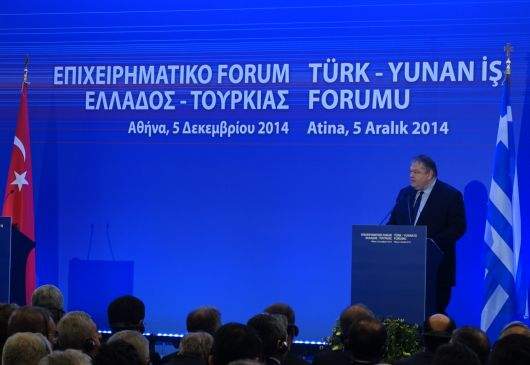 Below is the text of Deputy Prime Minister and Foreign Minister Venizelos’ speech at the Greek-Turkish Business Forum held in Athens:
Below is the text of Deputy Prime Minister and Foreign Minister Venizelos’ speech at the Greek-Turkish Business Forum held in Athens:
“Ladies and Gentlemen,
A warm welcome to the members of the business communities of Turkey and Greece, who are participating in today’s forum. The business world, the private sector, with its instinct, with its open horizons, has already shaped a dynamic framework for relations between Greece and Turkey. Our obligation, the obligation of the governments, is to politically support, to reaffirm in the clearest manner, these common efforts, and to stress that we remain dedicated to the goal of expanding economic cooperation, because the economy holds a central place in our bilateral relations.
Turkey is a large country, a large market, a candidate for accession to the European Union, and Greece always supports Turkey’s European perspective, on the condition, naturally, of compliance with the prerequisites that apply for all candidate countries, without overlooking the size and importance of the Turkish economy. But also the importance of the European perspective of a country that, for 62 years now, has, together with Greece, been a member of NATO; this country’s importance for the stability of our region. Greece and Turkey are historical pillars of stability in the wider region of Southeast Europe and the Southeastern Mediterranean.
Within the framework of the two previous High-Level Cooperation Councils, we proceeded to the signing of important agreements, thus building a strong legal framework for our bilateral cooperation.
What is important now is that we complete the required ratification processes and move ahead to the implementation of these legal texts in order to activate the vast dynamic for economic cooperation that exists in many sectors, including tourism, agriculture, construction; the banking and financial services sector.
And all of these, of course, are linked to the major issue both countries and both societies have: the demand for growth, the demand for employment, the demand for social cohesion.
It is of very great importance that we capitalize to the greatest extent possible on ambitious plans like the Trans Adriatic Pipeline (TAP), which is the continuation of the TANAP, and the creation of the southern energy corridor, which is ushering in a new era in the relations between the two countries. And following the new developments with regard to the South Stream, this all takes on an additional and exceedingly important development and international political dimension.
Recently – and we mentioned this in our speeches – we had very important developments in the cooperation of construction firms in third countries, and the joint presence of our companies in third countries, mainly in the Gulf countries, but also elsewhere, is a field of great success for our entrepreneurs.
It is worth noting that some 500 Greek companies are currently active in Turkey, and, naturally, tourism is a heavy industry – not just an economic activity; it is organized human contact. At the same time, it is culture and history; it is a source of constant refueling of our bilateral relations.
Ladies and Gentlemen,
As I imagine the Prime Minister will have the opportunity to say in greater detail, Greece is emerging into the light, turning a new page, after five hard years of sacrifices and national efforts. It is emerging from the memorandum and troika monitoring. It is regaining its autonomy, its equal footing within the Eurozone and the European Union. So now is the time for us to turn our attention to the real economy, and bilateral business cooperation, with the salient example of Greek-Turkish synergies, is a proof of the potential the Greek economy has, of the internationalization it must consolidate, and, of course, the same holds true for the Turkish side, I am sure.
The business forum held a few days ago in Izmir sent a very, very strong message. And today’s forum, here in Athens, is amplifying this message and broadcasting it, not just to the two countries, but also to the international market, and this is of very great importance.
Naturally, no economic initiative, no business cooperation, can supplant foreign policy and security and defence policy. Our region is facing an unprecedented number of crises. It is our joint obligation – with respect for international law and the international legal order – to do what we must, to do everything we can to contribute to the stabilization of the situation, to avert the escalation of violence, to, in the end, enforce peace, stability and security in the region.
I do not want to conceal the fact that the key to accelerating our bilateral relations and the full normalization of Greek-Turkish relations is the Cyprus issue and respect for international law and, in particular, the International Law of the Sea. This is obvious and self-evident, and when there is good will, it is feasible.
There were strong precursors of Greek-Turkish economic and political cooperation: the two historic leaders, Eleftherios Venizelos and Ismet Inonu, when, in 1930, in tandem with the Greek-Turkish friendship agreement, they promoted the signing of a bilateral trade agreement. And it was a very happy moment for me when, at the Ankara Palace, a few days ago, in Ankara, in the space where Eleftherios Venizelos and Ismet Inonu met, I met with my Turkish counterpart, Mevlut Cavusoglu, and we were photographed in front of the historic photograph of the two leaders.
Ladies and Gentlemen,
It is up to us whether we will follow in the footsteps of these two great historic leaders, or whether we will remain in a state of uncertainty and inertia. History does not forgive inaction, but nor does it forgive imprudence and amateurism. With seriousness, with very good preparation, with good faith we can shape the political framework for the impressive upgrading of our bilateral political relations and the even more impressive upgrading of our bilateral economic relations.
Welcome to Greece.
December 5, 2014


